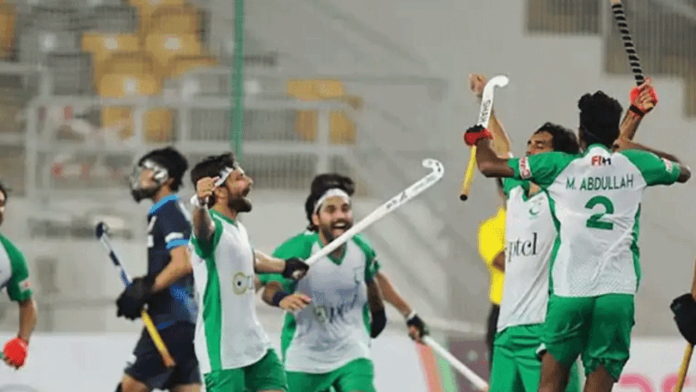In the must-win game against New Zealand, Pakistan produced a lackluster performance, losing 4-3 in a match that exposed glaring weaknesses in their defensive line. The Pakistani goalkeepers, Abdullah Ishtiaq and Muneeb, came under heavy criticism for their poor showing, failing to save routine shots and conceding avoidable goals. Observers and former players believe that the duo’s performance was far below international standards
Ansar M Bhatti/DNA
ISLAMABAD – In a surprising turn of events, Pakistan has qualified for the semifinal of the FIH Nations Cup Hockey Tournament in Malaysia despite a disappointing defeat at the hands of New Zealand in their last group match. Pakistan will now face France in the semifinal, after edging past Malaysia on goal difference, both teams having finished with four points in the group stage.
Pakistan’s journey to the semifinal has been a mixed bag. While the national team showed glimpses of brilliance in certain matches, inconsistency and underperformance in crucial areas — particularly goalkeeping — have raised serious concerns for the future.
In the must-win game against New Zealand, Pakistan produced a lackluster performance, losing 4-3 in a match that exposed glaring weaknesses in their defensive line. The Pakistani goalkeepers, Abdullah Ishtiaq and Muneeb, came under heavy criticism for their poor showing, failing to save routine shots and conceding avoidable goals. Observers and former players believe that the duo’s performance was far below international standards.
“The goalkeeping in the match against New Zealand was simply not acceptable,” said a former national coach. “If we are serious about competing at the top level, the Pakistan Hockey Federation (PHF) must urgently invest in grooming a new generation of goalkeepers.”
Despite the loss, Pakistan managed to qualify for the semifinal thanks to a better goal average than hosts Malaysia. While both teams finished with four points, Pakistan’s higher number of goals scored across the tournament helped them inch past Malaysia into the final berth. Malaysia will now contest for 5th to 8th place against South Africa, in what will be a disappointing end for the home side, who had hoped to make it to the final on home turf.
Meanwhile, France, who remained consistent throughout the group stage, will pose a formidable challenge for Pakistan in the final. The European side has displayed a balanced approach, combining a solid defensive line with sharp, coordinated attacking plays — a stark contrast to Pakistan’s unpredictable performances.
Beyond the field, Pakistan’s hockey is still reeling from administrative issues that have plagued the sport for years. The Pakistan Hockey Federation (PHF) has long been marred by internal politics, factionalism, and nepotism, which many believe is stunting the development of the sport.
“There’s no doubt we have talent, but until we fix the system, we will continue to struggle,” said a senior hockey analyst. “Selection should be based on merit, and administrative decisions must be free of political interference.”
As Pakistan heads into the semifinal against France, fans remain hopeful for a strong finish. However, the bigger question looms: Will this tournament mark the beginning of reform in Pakistan hockey, or will the same systemic issues continue to hold the sport back?
The semifinal between Pakistan and France is expected to be closely contested, with both teams aiming to lift the Nations Cup title. For Pakistan, it is not just a match — it could be a chance to restore some lost pride and start a new chapter.

















